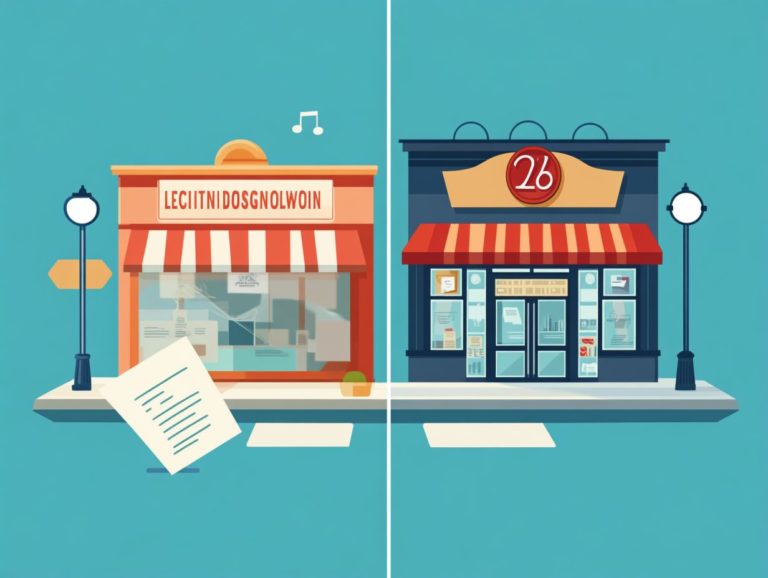5 Ways to Leverage Licensing Agreements for Growth
Licensing agreements are invaluable assets that can elevate your brand. They present unique avenues for growth, revenue generation, and product innovation.
This article delves into the nuances of licensing agreements, exploring their essential characteristics and their pivotal role in expanding your brand while fostering collaboration with other enterprises.
You will uncover how to effectively navigate the associated benefits and risks. Gain insights that empower you to leverage licensing for maximum impact.
Immerse yourself to unlock the immense potential that licensing holds for your business!
Contents
- Key Takeaways:
- 1. Understanding Licensing Agreements
- 2. Expanding Your Brand through Licensing
- 3. Increasing Revenue through Licensing
- 4. Utilizing Licensing for New Product Development
- 5. Collaborating with Other Businesses through Licensing
- Frequently Asked Questions
- What are licensing agreements and how can they be used for growth?
- What are some ways to leverage licensing agreements for growth?
- How can licensing agreements help businesses save money?
- Are there any risks associated with licensing agreements?
- What should businesses consider before entering into a licensing agreement?
- Can licensing agreements be beneficial for all types of businesses?
Key Takeaways:

Licensing agreements can expand your brand and boost revenue by harnessing the reputation and reach of another business.
When considering licensing for growth, carefully assess the benefits and risks involved. Be aware of the potential challenges that may arise.
Utilizing licensing for new product development and collaborating with other businesses can bring valuable resources and opportunities for growth.
1. Understanding Licensing Agreements
Understanding licensing agreements is crucial for startups aiming to navigate the intricate world of intellectual property (IP) law. These agreements can be pivotal in protecting your intellectual property while maximizing your market reach and revenue potential.
Typically, these contracts cover various components, such as definitions of the licensed intellectual property, the scope of use, compensation terms, and any territorial limitations.
You ll encounter different types of licensing agreements exclusive, non-exclusive, and sole licenses all of which carry their own strategic implications.
By leveraging these agreements effectively, you can gain significant advantages that allow you to enter new markets or access essential technologies. This approach also minimizes upfront costs.
Careful negotiation of the terms is vital to ensure compliance and protect the integrity of your patent portfolio. This ultimately lays a robust foundation for your future growth and innovation.
What Is a Licensing Agreement?
A licensing agreement is a legally binding contract that grants permission to use intellectual property, such as patents and trademarks, under specific conditions.
These contracts are essential for ensuring compliance with relevant laws and regulations, while also safeguarding the intellectual property rights of the owner. They enable you, as the licensee, to access and utilize valuable assets.
Both licensors and licensees have defined roles in this arrangement. Licensors typically take charge of protecting their property and maintaining control over its use. As the licensee, you must adhere to the terms to steer clear of any legal repercussions.
For startups, it s particularly vital to fully understand the legal implications of such agreements. Navigating the complexities of ownership and rights is crucial, as misunderstandings could lead to costly disputes that may jeopardize your business ventures.
Why Are Licensing Agreements Important for Growth?
As a startup, you must embrace licensing agreements to unlock growth opportunities, including ways to leverage your patents for funding, by expanding your market reach and fostering strategic partnerships.
By leveraging these agreements, you can tap into established networks and resources that might otherwise be quite challenging to access.
Take, for example, a new fashion brand that partners with a popular influencer; this collaboration could lead to instant visibility and credibility, resulting in increased sales and enhanced brand loyalty.
Disney s licensing arrangements with toy manufacturers have not only driven extensive product lines but also fortified the company s brand presence around the globe.
These collaborations show how you can supercharge your brand recognition, navigate new markets, and drive business growth through shared expertise and resources.
What Are the Different Types of Licensing Deals?
Different types of licensing deals exclusive, non-exclusive, and sole licenses offer distinct levels of control and market access.
These agreements enable you to leverage established intellectual property while tailoring your business strategies around it.
For example, an exclusive license grants you exclusive rights, meaning you are the only one allowed to use, sell, or distribute a product or brand. This provides a competitive advantage, though it often comes with higher upfront fees.
In contrast, a non-exclusive license allows multiple parties to share rights. This option is more budget-friendly and can expand your market reach, but it may also increase competition.
Sole licenses strike a balance, giving you exclusive rights while allowing the licensor to utilize those rights as well.
As a startup, you can carefully select the most suitable type based on your objectives, available resources, and market aspirations. This underscores the importance of strategic thinking in driving long-term growth.
2. Expanding Your Brand through Licensing
Expanding your brand through licensing unlocks significant strategic advantages! It enhances your market reach while diversifying your revenue streams.
This approach opens exciting doors to new marketplaces and encourages collaboration with other innovators in your industry.
For example, a popular toy brand partnered with a renowned animation studio, leading to remarkable growth in brand recognition. By leveraging each other s strengths, they successfully created an engaging product line that captivated a broader audience.
Such partnerships illustrate how effective licensing strategies ignite creativity and innovation, fostering enhanced consumer loyalty and boosting profitability across the board.
How Can Licensing Help Expand Your Brand?
Licensing is a powerful tool for expanding your brand! It opens doors to new markets and valuable partnerships with established players in the industry.
By entering into strategic licensing agreements, you can tap into previously unexplored customer bases, reaping the rewards of your partners’ solid reputations and extensive distribution networks.
Imagine a small apparel brand collaborating with a globally recognized fashion label. This partnership could open doors to high-fashion boutiques, attracting discerning consumers who appreciate quality and style. Not only does this boost visibility, but it also enhances your credibility through association.
Consider Disney and Marvel, who have excelled at licensing their beloved characters for various products. This savvy maneuver allows them to reach diverse audiences and engage customers across multiple demographics, showcasing the potential of effective licensing.
What Are the Benefits of Licensing Your Brand?

Licensing your brand presents a wealth of advantages! You can enjoy heightened brand recognition, diversified revenue streams, and the opportunity to forge strategic partnerships that fuel growth.
By engaging in licensing, you can significantly reduce your marketing costs. Collaborators often come equipped with established channels and networks that boost visibility without demanding a hefty investment.
This approach sparks innovation by drawing on external expertise and cultivates an environment of creativity, allowing for the exploration of fresh ideas together.
These strategic partnerships can lead to long-lasting relationships, fostering trust and collaboration that benefit everyone involved. This ensures sustained growth and mutual success for your brand.
What Are the Risks of Licensing Your Brand?
While licensing can offer big benefits, it also brings potential risks. These include loss of quality control, disputes, and challenges negotiating termination conditions.
Brands often clash with their licensees when values or visions don t align. This can jeopardize the brand’s integrity.
Without strict quality standards, consumer perception can suffer. This usually leads to less loyalty and reduced sales.
To guard against these risks, companies like yours should invest time in crafting clear agreements. These agreements should define expectations for quality and ethical practices.
Regular communication is important to keep everyone aligned. Implement comprehensive oversight protocols to maintain brand integrity.
3. Increasing Revenue through Licensing
Increasing revenue through licensing is a smart move. It allows you to create additional revenue streams by monetizing your creative ideas.
By using various royalty structures, you can implement money-making plans that boost profitability. They also provide a safety net during tough economic times.
For instance, tiered royalties, flat rates, or percentage earnings can be customized based on market needs. This adaptability is vital as consumer demands change.
Diversifying your licensing portfolios opens up scalable revenue opportunities. This lets you invest in innovation and grow your presence in the market.
How Can Licensing Help Increase Revenue?
Licensing is a great way to boost revenue. It allows your company to charge royalties for its creative ideas, ensuring a steady income.
For example, a toy company might collaborate with a film studio to launch action figures. This partnership boosts brand visibility and generates substantial royalty payments.
Different royalty models, such as a flat fee or a percentage of sales, each impact revenue differently. A percentage model can motivate both parties to promote the product actively.
These agreements show how licensing can drive financial growth across various industries, making it a key success factor.
What Are the Key Factors to Consider When Licensing for Revenue?
When licensing for revenue, understand the financial aspects involved. Establish a fair royalty structure and identify potential negotiation challenges.
A market analysis is critical for valuing your creative ideas. It helps you understand industry standards and the competitive landscape.
Communicate terms clearly during negotiations. This builds trust and minimizes misunderstandings that could jeopardize the deal.
As you discuss, clearly state your objectives and limitations. This leads to smoother transactions and fruitful partnerships.
What Are the Potential Challenges of Licensing for Revenue?
Licensing for revenue can come with challenges. These include negotiation hurdles, disputes over terms, and ensuring compliance with contracts.
Understand common negotiation pitfalls and develop strategies to navigate them. Establish clear dispute resolution mechanisms from the start.
Being flexible in licensing agreements allows for necessary adjustments. This fosters a collaborative environment that benefits everyone involved.
4. Utilizing Licensing for New Product Development
Licensing opens many new opportunities for innovation and collaboration. It lets your startup access external technologies and expertise.
This strategy speeds up your product development cycle and boosts potential for groundbreaking advancements.
For instance, you could license a patented software algorithm and pair it with your own hardware. This combination can lead to a completely new product.
A great example is Apple’s partnerships with software developers, sparking a surge of apps that enhance user experience.
Licensing agreements encourage creativity and drive business growth. They create a dynamic ecosystem of shared knowledge.
How Can Licensing Aid in New Product Development?

Licensing transforms your product development. It gives you access to technologies and expertise that might be out of reach.
This access often leads to unique collaborations, as established companies want to share their technologies for profit.
For example, a small tech firm partnered with a leading software company. Together, they integrated advanced machine learning algorithms into their product.
The result was a groundbreaking solution that outperformed competitors.
Such collaborations foster a lively environment for idea exchange. This leads to continuous improvements and designs that meet market needs.
What Are the Advantages of Using Licensing for New Product Development?
Licensing offers compelling advantages: cost efficiency, faster market entry, and enhanced innovation.
By leveraging licensed technologies, you can cut research and development costs significantly. This allows for smarter allocation of your funds.
As a result, you can launch innovative products that respond to consumer demands while reducing risks.
These strategic benefits improve your competitive edge and help you enter the market faster, positioning you ahead of slower rivals.
What Are the Possible Drawbacks of Using Licensing for New Product Development?
While licensing brings benefits, be aware of potential drawbacks. These include quality control issues and dependence on external partners.
Such risks can create unforeseen problems that might hurt your brand image. If the licensed technology doesn’t meet standards, it can compromise your product.
To navigate these challenges, establish clear quality metrics in your agreements. Keep communication open with your partners and include strong oversight clauses.
Develop exit strategies to protect your interests if licensing ends. This will help maintain your brand’s reputation.
5. Collaborating with Other Businesses through Licensing
Collaborating with other businesses through licensing can pave the way for partnerships that benefit everyone, enabling you to transfer technology and expand into new markets.
Such strategic alliances enable you to leverage each other’s strengths, fostering innovation while minimizing risk. Consider the partnership between Apple and various app developers; it showcases the true potential of licensing agreements.
By granting developers rights to create applications for the iOS platform, Apple not only enhances the user experience but also accelerates its growth through a vibrant app ecosystem.
Similarly, when sports brands team up with fashion labels, licensing opens doors to new customer bases and creates unique product offerings. These examples show how licensing helps businesses grow and adapt quickly, allowing you to respond swiftly to market demands.
How Can Licensing Facilitate Collaborations with Other Businesses?
Licensing can be your pathway to seamless collaborations with other businesses, establishing frameworks for sharing intellectual property, like inventions or brand names, while minimizing risks and maximizing rewards.
This arrangement doesn t just provide a clear structure for cooperation; it cultivates an environment where innovation flourishes for both parties. Through these agreements, you can co-develop products that harness each other’s strengths, helping you reach more customers.
Sharing technology fosters a collaborative culture, enabling both entities to break new ground in their respective fields. As you pool resources and knowledge, the potential for groundbreaking innovations skyrockets, ultimately benefiting consumers and propelling advancements within the industry.
What Are the Benefits of Collaborating with Other Businesses through Licensing?
Collaborating with other businesses through licensing opens up a realm of opportunities for you, offering shared resources, enhanced innovation, and access to new customer bases.
These partnerships can save you money and help you do more with less! When you align your goals and values with those of your partners, you cultivate a collaborative spirit and build trust, which is crucial for effective risk mitigation.
By working together, you can navigate uncertainties more adeptly, share best practices, and develop strategies that benefit everyone involved. Ultimately, when you and your partners are united in purpose and perspective, such collaborations can provide a competitive edge in the marketplace, driving growth and sustainability for all parties in the partnership.
What Are the Potential Challenges of Collaborating with Other Businesses through Licensing?
Collaborating with other businesses through licensing can present challenges, such as negotiation hurdles, misaligned objectives, and the complexities of managing partnerships.
These complications often arise from unclear communication and poorly defined roles, leading to misunderstandings and conflicts. To navigate these risks, it s essential for everyone involved to establish an open line of communication right from the start.
This should involve regular check-ins to ensure alignment with the project’s goals and expected outcomes. Crafting a roadmap that outlines each party’s responsibilities can clarify expectations and encourage accountability.
By taking these proactive measures, you can effectively navigate the intricacies of licensing agreements and cultivate stronger, more fruitful partnerships.
Frequently Asked Questions

What are licensing agreements and how can they be used for growth?
Licensing agreements are legal contracts that allow a company or individual to use another party’s intellectual property, such as trademarks, patents, or copyrights, in exchange for a fee. By leveraging these agreements, businesses can gain access to valuable resources, expand their reach, and boost growth.
What are some ways to leverage licensing agreements for growth?
Licensing agreements can help businesses enter new markets. Partnering with a local company can boost reach and customer growth.
Another option is to license out creative assets. This allows companies to earn revenue by letting others use their trademarks, patents, or copyrights.
How can licensing agreements help businesses save money?
Licensing agreements help businesses save money by giving them access to resources and technology. This is especially useful for smaller companies that can’t afford heavy investment in research and development.
Are there any risks associated with licensing agreements?
Licensing agreements pose risks. Businesses may lose control over their creative assets or face legal disputes.
What should businesses consider before entering into a licensing agreement?
Before entering a licensing agreement, businesses must weigh the benefits against the risks. They should also check the other party’s reputation and financial health, along with the agreement’s terms, fees, and duration.
Can licensing agreements be beneficial for all types of businesses?
Licensing agreements can be a game-changer for many businesses. However, not all companies will benefit evaluate your goals and market position to see if this strategy aligns with your growth plans.






